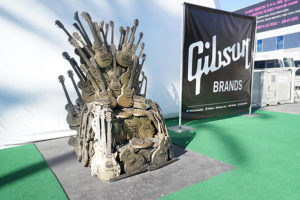A Big Shakeup At Gibson Could Be Coming Soon
 In 2012 execs at Gibson Guitar saw that the musical instrument business was in the midst of a what has now become a long slow decline, with fewer new buyers of guitars as tastes in music changed. The company wisely sought to diversify and went on a buying spree, purchase interests in companies like Onkyo, Tascam, Esoteric, and Stanton (among quite a few others) in an effort to make up for what looked like a potential loss of future revenue. The problem was that the company borrowed the money for the acquisitions, and none have exactly turned into a cash cow since. As a result, the company is now facing the prospect of several huge debt payments that it might not be able to meet or refinance.
In 2012 execs at Gibson Guitar saw that the musical instrument business was in the midst of a what has now become a long slow decline, with fewer new buyers of guitars as tastes in music changed. The company wisely sought to diversify and went on a buying spree, purchase interests in companies like Onkyo, Tascam, Esoteric, and Stanton (among quite a few others) in an effort to make up for what looked like a potential loss of future revenue. The problem was that the company borrowed the money for the acquisitions, and none have exactly turned into a cash cow since. As a result, the company is now facing the prospect of several huge debt payments that it might not be able to meet or refinance.
As reported by the tech business site Strata-gee, Moody’s has downgraded Gibson’s credit rating mostly because of the upcoming $520 million in debt coming due in 2018, and the fact that it’s revenues are steadily declining. As a result, Moody’s took took its position because, “Gibson’s weak operating performance, liquidity pressure from approaching maturities, and the view that the company’s capital structure is unsustainable.” Gibson Brands has a $145 million secured bank loan coming due July 23, 2018, and another $375 million note coming due on August 1, 2018.
While Gibson is selling off some of its assets to draw down the debt (like these properties in Nashville), Moody’s doesn’t feel that will make a substantial difference. Once reason is the fact that the company is limited in the number and types of guitars that it can make due to new government regulations for certain wood products. This is the Gibson’s main major source of income, so fewer models plus fewer buyers doesn’t bode well for the future.
While you can’t fault the company for trying to diversify due to the impending slide in guitar sales (which as an industry are about half of what they were a decade ago), borrowing money to do so is the big problem here. A bet was made that the newly acquired companies would make up for the shortfall. The only problem with that strategy was that the companies that Gibson purchased were pretty much in the same industry and were having problems as well.
Anyone who’s been in the music business on some level knows how revered the Gibson name and brand is. Let’s hope that regardless what happens, that legacy is preserved.

